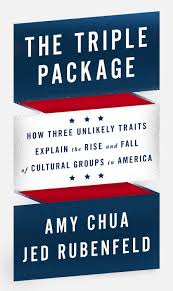The ‘Tiger Mom’ Superiority Complex
< < Go Back
By Suketu Mehta,
A new book from Amy Chua and Jed Rubenfeld seeks to explain why some groups succeed in America, and some fail. But when does cultural pride cross over into racism?
From time to time, every Indian American finds an email in his or her inbox, wearing a font of many colors, like the one my grandfather once sent me: “Take a Pride–Being an Indian. 38% of Doctors in U.S.A. are Indians. 36% of NASA employees are Indians. 34% of MICROSOFT employees are Indians. India invented the Number System. Decimal Point was also invented by India. Sanskrit is the most suitable language for computer software …”
On my desk now is a book-length version of such an email: The Triple Package: How Three Unlikely Traits Explain the Rise and Fall of Cultural Groups in America, by Amy Chua and Jed Rubenfeld. You may remember Chua as the “Tiger Mom” whose 2011 memoir about the rigors of Chinese parenting set off waves of anxiety among aspirational American parents who had been raised with Dr. Spock’s permissive child-rearing attitudes. Her new book, co-authored with her husband, widens its aim, purporting to explain why not just Asians (like Chua) but also seven other groups–Cubans, Jews (like Rubenfeld), Indians (like me), Nigerians, Mormons, Iranians and Lebanese–are superior when it comes to succeeding in America.
The book claims that these groups thrive because of three traits: a superiority complex, insecurity and impulse control. The ones lacking the “Triple Package” are African Americans, Appalachians, Wasps and pretty much everybody else.
Does such thinking shock you?
I call it the new racism–and I take it rather personally.
Recently, … the language of racism in America has changed, though the plot remains the same. It’s not about skin color anymore–it’s about “cultural traits.” And it comes cloaked in a whole lot of social-science babble. The new racialists are too smart to denigrate particular cultures. Instead, they come at things the other way. They praise certain cultures, hold them up as exemplary. The implication–sometimes overt, sometimes only winked at–is that other cultures are inferior and this accounts for their inability to succeed.
The U.S.–like Brazil or England–likes to think it has moved beyond race. After all, we elected a black President, twice. But in reality, the terrain of race-baiting has simply shifted. The condescension once aimed squarely at African Americans now also claims as its targets Latinos, Muslims and–in a novel twist–large swaths of whites. And the people doing the condescending might be black or brown themselves.
A Congolese immigrant whom I met in the course of researching my book told me about the African Americans she knows at the supermarket where she works. “We are really different,” she said about her community, as opposed to African Americans. “They don’t have African values. They don’t have the values to be black.”
I asked her what that means.
“To be black,” she explained, “means you get married and you don’t have children before.” The American blacks at her supermarket, she said, need to go to college. “They ask if you want to have marijuana. It’s just normal for them. It’s easy for them to say that ‘My ancestors were oppressed.'”
A book like The Triple Package, even if it takes pains to argue in nonracial terms, is an example of this sort of ethnocentric thinking writ large.
More From TIME Magazine (subscription required):




